The following is a text commissioned by film critic and scholar Francois Thomas for an ongoing online series, “Les Papiers Alain Resnais,” devoted to items in the Alain Resnais archives and individual commentaries about them (https://www.imec-archives.com/matieres-premieres/papiers/alain-resnais). Rather than post my original English text, which Thomas translated into French, and which appeared on the site in French and English last week, I’ve slightly revised the web site’s English translation of his French text to make it both more idiomatic and closer to what I had in mind. And I begin with his “hasty” English translation (with explanatory glosses in brackets) of Resnais’ letter, which he did for me, reproduced here in bold. (Francois told me that Resnais hated to write letters and wrote very few of them; this one was mostly typewritten.)
Letter from Alain Resnais to Richard Seaver on the Délivrez-nous du bien project , October 20, 1970:
Dear Dick,
Your letter of October 10 from Southampton [New York] arrived last night. Probably intersected with the one I sent on the 8th, containing answers to several questions you asked me. But — is it a feeling — you don’t seem to be aware of the one I sent you on September 9 (and I remember that you didn’t seem to have received one of the notes I sent from London at the end of July either).
From the Chicago Reader (June 19, 1998). — J.R.
Hav Plenty
Rating *** A must see
Directed and written by Christopher Scott Cherot
With Chenoa Maxwell, Cherot, Tammi Catherine Jones, Robinne Lee, and Reginald James.
Mr. Jealousy
Rating *** A must see
Directed and written by Noah Baumbach
With Eric Stoltz, Annabella Sciorra, Chris Eigeman, Carlos Jacott, Marianne Jean-Baptiste, Brian Kerwin, Peter Bogdanovich, and Bridget Fonda.
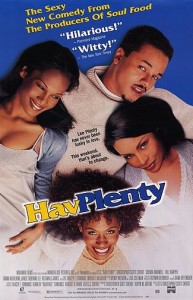
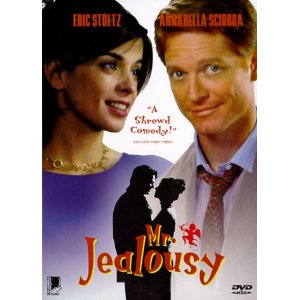
Two eclectic, youthful, and surprisingly upbeat romantic comedies open this week, both by writer-directors; both about blocked novelists, relationships, fear of commitment, jealousy, self-torturing neurosis, betrayal, and ultimate fulfillment; and both set in upscale, urban east-coast milieus. I had a good time at Christopher Scott Cherot’s Hav Plenty and Noah Baumbach’s Mr. Jealousy both times I saw them, though I couldn’t believe in either all the way through, and neither made me laugh out loud very often. Presented as hand-crafted self-portraits that have agreed to play by certain commercial rules and genre conventions, both teem with eccentric tics and personal energies, giving us the pleasure of contact with an individual intelligence — something that seldom happens with bigger-budget fare.
The eccentric tics in Hav Plenty begin with the title — which conflates the first name of heroine Havilland Savage (Chenoa Maxwell) and the last name of hero Lee Plenty (Cherot) — and include Philippians 4:12 (“I know what it is to be in need, and I know what it is to have plenty. Read more
From the February 18, 2000 Chicago Reader. This piece is reprinted in my Goodbye Cinema, Hello Cinephilia.— J.R.
Alone. Life Wastes Andy Hardy
Rating *** A must see
Directed by Martin Arnold
With Mickey Rooney, Judy Garland, and Fay Holden.
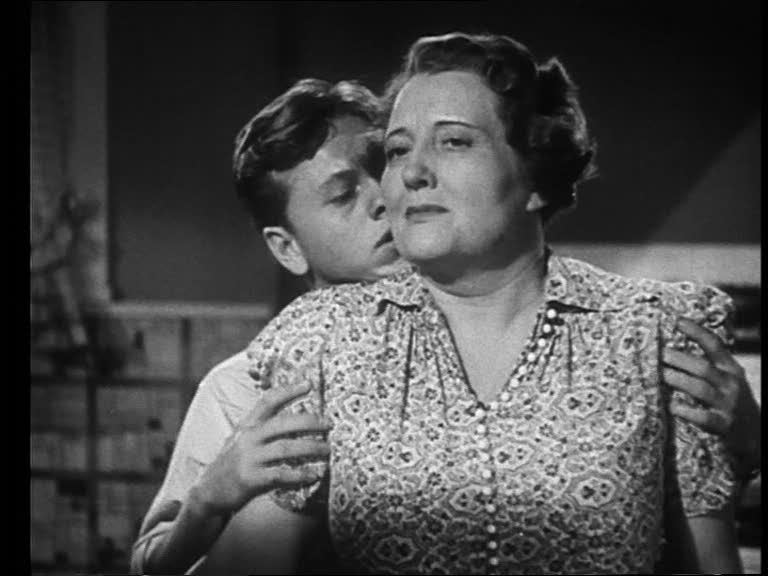
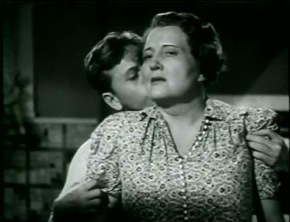
Wearing suspenders, Mickey Rooney as Andy Hardy steps behind his mother (Fay Holden), clutching her left shoulder and right forearm with his two hands, and firmly kisses the back of her neck while she slowly nods her head with a stoic, worldly-wise expression. In a series of stuttering, staccato jerks, he does the same thing again, to the throbbing strains of eerie, ghostly music. Then he does it a third time, pausing first to rock back and forth from one foot to another a good many times, as if he had ants in his pants. When he kisses the back of his mom’s neck this time, his lips seem to remain glued there. This embrace, his barely perceptible jaw movements, and her steadily bobbing head all conspire to suggest something vaguely obscene and depraved. Could Andy have become some kind of Dracula, sucking blood from his mother’s neck? Or do the slow pumping rhythm and repeated nervous thrusts represent some kind of sexual motion? Read more
From the Chicago Reader (September 1, 1998). — J.R.
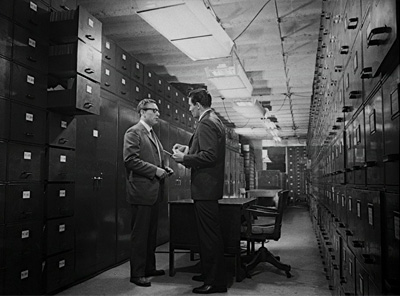
After seeing the work print of his last Hollywood feature, Orson Welles wrote a lengthy memo requesting several changes in editing and soundwork that was carried out in 1998 by producer Rick Schmidlin and editor Walter Murch with myself as consultant. About the original 95-minute 1958 release (superseded since the mid-70s by a 108-minute preview version), Dave Kehr wrote, “Eternal damnation to the wretch at Universal who printed the opening titles over the most brilliant establishing shot in film history — a shot that establishes not only place and main characters in its continuous movement over several city blocks, but also the film’s theme (crossing boundaries), spatial metaphors, and peculiar bolero rhythm.” These titles now appear at the film’s end — yielding a final running time of 111 minutes — and in the opening shot Henry Mancini’s music comes exclusively from speakers in front of the nightclubs and from a car radio. Other changes involve different sound and editing patterns and a few deletions, all of which add up to a narrative that’s easier to follow, but there’s no new or restored footage. To quote Kehr again, “Welles stars as the sheriff of a corrupt border town who finds his nemesis in visiting Mexican narcotics agent Charlton Heston; the witnesses to this weirdly gargantuan struggle include Janet Leigh, Marlene Dietrich, Akim Tamiroff, and Joseph Calleia, who holds the film’s moral center with sublime uncertainty.” Read more





